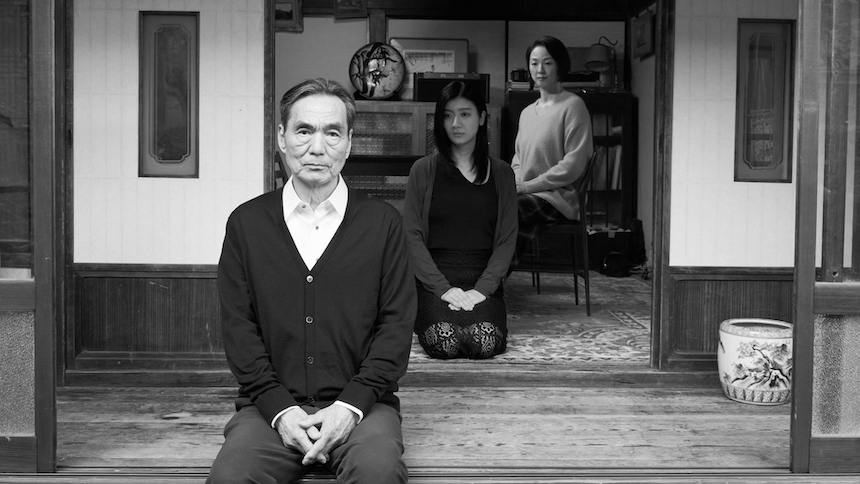Udine 2025 Review: TEKI COMETH Details a Slide Into Madness
Kyozo Nagatsuka is superb as a professor who is losing touch with reality.

Based on a novel by Yasutaka Tsutsui, Teki Cometh details an elderly professor's decline with almost clinical detachment. Shot in glistening black-and-white, director Daihachi Yoshida’s film is obstinately cold, a Perfect Days in reverse.
Gisuke Watanabe (Kyozo Nagatsuka) leads an austere, almost spartan life in a rambling house filled with manuscripts and memorabilia. Cleaning, shopping, and cooking take up most of his time.
Watanabe prepares lectures about his specialty, French literature, angry about his low fees but afraid to ask for more money. He writes occasional pieces for a former student who works on a travel magazine. Yasuko (Kumi Takeuchi), another former student, has been bothered by a stalker in the past and is contemplating divorce.
Her visits prompt sexual visions that trouble and provoke the widowed professor. Health issues result in fantasies about doctors and nurses. A colonoscopy turns into an exercise in sadomasochism. Photographs spark memories of his dead wife Nobuko (Asuka Kurosawa). Soon he is arguing with her over meals about having sex with Yasuko.
Watanabe sometimes meets a colleague, an architectural designer, at a bar called the Vol du Nuit. At first he limits his drinks, but as the months pass, he edges into alcoholism. He's drawn to the bar owner's niece, Takatsu Azumi (Yumi Kawai), a college drop-out. He agrees to help with her tuition, aware that she is most likely cheating him.
Kabashimi, another former student who runs a theatrical prop company, offers to repair a disused well in Watanabe's back yard. When he cleans out a shed there, Watanabe stumbles across family photos that inspire more fantasies.
At the bar, Watanabe reveals his plan to deal with his precarious finances. "X-Day" will be when his money runs out, and presumably the day he dies. Meanwhile, computer messages warn him of an "enemy" from the North.
Fantasy and reality blur together. Does Watanabe host a dinner party with a menu based on Proust's novels? If so, is his former student shot and killed? Does Watanabe dump his body in the backyard well?
Like Kôji Yakusho in Perfect Days, Nagatsuka is a formidable performer whose skill adds gravity to a plot that is not quite as deep as the filmmakers hope.
Some of the locations, characters, and even scenes here seem to comment directly on the Wim Wenders film, which faced criticism for its optimistic outlook. Instead of enjoying a gentle relationship with a singer in a jazz bar, Watanabe is swindled by an age-inappropriate hustler. Instead of a healthy lifestyle marked by bicycling, Watanabe becomes increasingly frail and delusional. Instead of the solace of music and literature, Watanabe loses faith in art, culture, the past.
The fantasy sequences in Teki Cometh, as well as the film's black-and-white pallor, have some critics mentioning David Lynch. A better insight might be Lynch's The Straight Story, another calm, precise film about pending death.
Comparisons aside, it's clear that Yoshida is an accomplished filmmaker. Not one scene is wasted or unnecessary, even those that don't seem to make sense. Shinomiya Hidetoshi's carefully composed and lit cinematography helps flesh out Yoshida's vision of a world filled with mystery and terror.
Teki Cometh won awards for Film, Director, and Actor at the Tokyo International Film Festival, and Director at the Asian Film Awards. It screened recently at the 27th Far East Film Festival in Udine, Italy.







